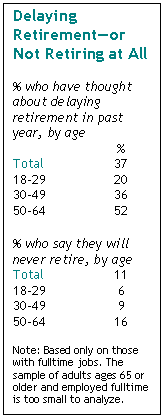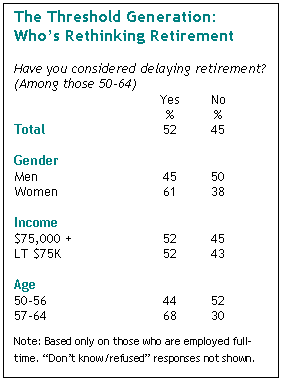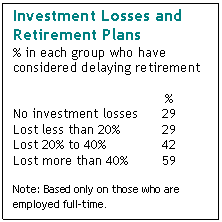In the midst of a recession that has taken a heavy toll on many nest eggs, just over half of all working adults ages 50 to 64 say they may delay their retirement — and another 16% say they never expect to stop working, according to a national survey by the Pew Research Center’s Social & Demographic Trends Project.

Overall, 37% of full-time employed adults of all ages say they have thought in the past year about postponing their eventual retirement. This proportion swells to 52% among full-time workers 50 to 64. Members of this so-called “Threshold Generation” are twice as likely as younger workers to say they never plan to retire (16% vs. 8%).
Moreover, the Thresholders who do plan to retire someday say they plan to keep working, on average, until they are age 66 — when they would be four years older than the age at which current retirees 65 or older report that they stopped working.
The Pew Research survey also finds that it may not be how much you earn but how much you lost in the investment market meltdown that determines whether you are re-thinking your retirement plans. Among the Threshold Generation as well as among other age groups, higher-income earners are only slightly less likely than lower-income adults to have considered postponing retirement. But regardless of income or age, those who have lost 40% or more of their investment nest eggs are roughly twice as likely as those who haven’t lost money in the market meltdown to say they have thought about delaying their eventual exit from the workforce.
The heightened inclination to delay retirement appears to be driven in part by the current recession, but it is also in sync with longer-term labor market trends. The labor force participation rate of those ages 65 and older has increased from 12.9% in 2000 to 16.8% in 2008.1 A similar trend is also evident this decade among members of the Threshold Generation.
The Pew Research findings are based on a telephone survey of a nationally representative sample of 2,969 adults conducted from February 23 through March 23, 2009. An earlier report based in part on that survey explored the varied impact of the recession on young, middle-aged and older adults. This new analysis examines in greater depth the impact of the recession on the retirement plans of one particular group: adults ages 50 to 64 who are employed fulltime. Poised at the threshold of retirement, these working Americans have suffered the greatest losses in their nest eggs and worry the most about their financial future.
The Demographics of Delay
Age is not the only demographic factor that helps predict who has been rethinking their retirement plans. Among all age groups, nearly half of all full-time employed women (46%) say they have thought about delaying retirement in the past year, compared with less than a third of all working men (31%). Also, 40% of whites have thought about extending their working lives, compared with 32% of blacks and 34% of Hispanics.
Income matters, too, in whether people are considering delaying retirement — but not as much as one might think. Among those with family incomes of less than $30,000, more than four-in-ten (44%) have thought about postponing their retirement, compared with 37% of those earning $100,000 or more. Similarly, more than a third of those making $30,000 to $50,000 (36%) and $50,000 to $100,000 (38%) have considered working longer as the recession settled in during the past year.
The Threshold Generation

Nothing like hard times in late middle age to focus the mind: In the past year, those on the threshold of retirement have given the most thought about the timing of their departure from the workplace. Among adults 50 to 64 who are employed fulltime, slightly more than half (52%) say they have thought about delaying retirement, with women once again the most likely to say so.
Six-in-ten women working full-time in this age group say they have reconsidered when they will retire, compared with slightly less than half of all men (61% vs. 45%), a gender gap consistent with other research that has found women often approach retirement age with fewer economic resources to draw on than do men. But among these late-middle aged adults, there is little difference by income: those with family incomes of $75,000 or more are as likely as those earning less to say they have considered delaying retirement.
Working adults who are closer to the traditional retirement age of 65 are even more likely than younger members of the Threshold Generation to have considered delaying their retirement. Some 68% of those ages 57 to 64 say they have thought about delaying retirement, compared with 44% of those ages 50 to 56.
The Confidence Gap
Working members of the Threshold Generation are the least confident of any age group that they will have enough money to make it through their retirement years. Barely two-in-ten (21%) of those ages 50 to 64 say they are “very confident” that they have enough income and assets to tide them over, compared with 37% of fulltime workers younger than age 30 and 40% of those ages 65 and older.
Most Americans, young or old, say that the recession has made it harder to take care of their financial needs in retirement. But working adults in the Threshold Generation are more inclined than any other age group to feel this way. Among those ages 50 to 64 with fulltime jobs, more than three-quarters (78%) say that the recession has made it harder for them to take care of their financial needs in retirement, compared with 66% of those younger than 50.
Income matters surprisingly little in fueling the recession-driven financial worries of the Threshold Generation. Some 69% of those with family incomes under $30,000 as well as 76% of those with incomes of $100,000 or more say the recession will make it harder to take care of their financial needs once they retire.
Similarly, there is little difference by gender, by levels of education or by race, suggesting that these concerns are broadly felt by many of adults nearing the end of their working lives.
Investment Losses and Retirement Plans

The worries of the Threshold Generation are rooted in reality: Among all adults, it is the Threshold Generation that has seen the value of their investments decline the most in the past year. About three-quarters of adults ages 50 to 64 say they lost money in mutual funds, individual stocks or retirement accounts such as a 401(k), compared to barely half of those younger than 50 (76% vs. 54%).
These losses appear to have helped trigger some rethinking about the timing of retirement. Working members of the Threshold Generation who lost money on investments are more likely than those who didn’t suffer losses to say they’ve considered delaying retirement (54% vs. 45%). And they’re more likely to have considered taking this step than are adults below the age of 50 who lost money in the market (54% vs. 34%).
Investment losses also impact financial confidence. More than eight-in-ten (82%) working members of the Threshold Generation who lost money in the past year say the recession will make it harder for them to meet their financial needs in retirement, compared with 66% of those ages 18 to 49.
Size matters, the survey also found. Among all adults employed fulltime, those who lost 40% or more of their investment nest eggs are twice as likely as those who lost nothing to say they have thought about delaying their exit from the workforce (59% vs. 29%). While the sample size is too small to draw firm conclusions, the pattern is roughly t he same for employed members of the Threshold Generation: Those who lost more than 20% are about twice as likely to say they have considered delaying retirement as are those who sustained smaller setbacks or did not lose money.
About the Survey
Results for this report are from a telephone survey conducted with a nationally representative sample of 2,969 adults living in the continental United States. A combination of landline and cellular random digit dial (RDD) samples were used to cover all adults in the continental United States who have access to either a landline or cellular telephone. In addition, oversamples of adults 65 and older as well as blacks and Hispanics were obtained. The black and Hispanic oversamples were achieved by oversampling landline exchanges with more black and Hispanic residents as well as callbacks to blacks and Hispanics interviewed in previous surveys. A total of 2,417 interviews were completed with respondents contacted by landline telephone and 552 from those contacted on their cellular phone. The data are weighted to produce a final sample that is representative of the general population of adults in the continental United States.
- Interviews conducted Feb. 23-March 23, 2009
- There were 2,969 interviews, including 1,332 with respondents 65 or older. The older respondents included 799 whites, 293 blacks and 161 Hispanics.
- Margin of sampling error is plus or minus 2.6 percentage points for results based on the total sample at the 95% confidence level.
- For data reported by race or ethnicity, margin of sampling error is plus or minus 3.5 percentage points for sample of older whites, plus or minus 7.4 percentage points for older blacks and plus or minus 10.3 percentage points for older Hispanics.
- Note on terminology: Whites include only non-Hispanic whites. Blacks include only non-Hispanic blacks. Hispanics are of any race.
Survey interviews conducted under the direction of Princeton Survey Research Associates International.




